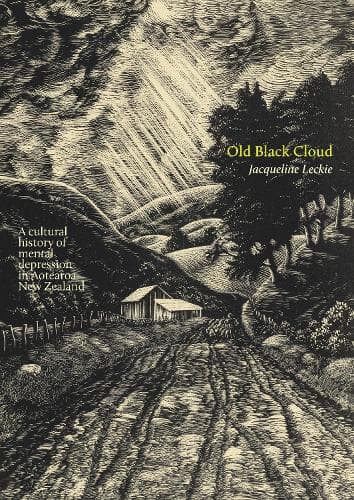Review — Old Black Cloud, by Jacqueline Leckie
Reviewed by Allan McEvoy
Don’t be put off by the foreboding cover. Jacqueline Leckie’s latest book Old Black Cloud: A cultural history of mental depression in Aotearoa New Zealand is a highly accessible, uniquely insightful, and in-depth exploration of mental depression as an intrinsic part of our national fabric.
Leckie covers events, evolving attitudes and terminology (from melancholia to neuroses to depression) among multiple demographics across the span of postcolonial Aotearoa, illustrating the struggles of both indigenous and immigrant populations through the lens of mental illness. She uses extensive case studies, academic literature, historical records and contemporary media reports to build an intricate picture, one that has all too often been overridden and expunged from the historical record.
The impact of European arrival and the devastating encroachment of colonisation on Māori are explored, alongside factors familiar to all populations in Aotearoa. Hardship, substance abuse, abuse and conflict within relationships, cultural and geographical dislocation all inform the conversation. From bush-clearing would-be farmers to gold miners to modern individuals across the motu, stories of hope, loss, misunderstanding, and shame are shared, narratives that will resonate for many due to personal experience, memories handed down or intergenerational trauma.
There is an acknowledged dearth of information covering the colonial period and the predominance of contradictory opinions – notably, a hesitancy among some Pakeha “to apply Western definitions of madness to Māori”, running concurrent with the narrative that “The nervous system of the savage, along certain directions, is more unstable than that of the more civilised races . . . owing to defective inhibition or control of the higher centres’ (sourced from Buck, ‘Medicine Amongst the Māori's, 77).
Historical snapshots capture the time periods well, and are often illuminating, sometimes in startling ways, such as that of John S, who after experiencing years of ‘attacks of melancholia’ and two head injuries, one resulting in eye damage and a paralysed arm, would on admission to Seacliff have the cause of his malaise “attributed to masturbation”, or that Edward Gibbon Wakefield “suffered bouts of depression that would take weeks to lift”.
Leckie’s observations on the impact of war on New Zealanders include the immediate and ongoing effects of ‘shell shock’ (PTSD), as well as the disappointment and psychological impact of what it meant to stay behind, for generations that prized strength and heroic ideals. The evolving understanding of depression and mental illness, social attitudes, treatments from healthy outdoor lifestyles to medications, from secretive lobotomies and ECT to open discussion and education, demonstrates a meticulous engagement with the subject material. The renaissance of te ao Māori, including wider acceptance of Māori concepts of health and wellbeing, offer elements of indigenous hope to tangata whenua and tauiwi alike.
Leckie discloses her personal connection to the subject matter upfront. Aspects of her own history of depression are shared within, bringing in a level of understanding and empathy in her writing that might otherwise be unreachable. She presents her findings in an engaging, non-academic manner, and despite its sombre subject material, she also finds much to entertain the reader.
Old Black Cloud is an important book that provides an accessible picture of how attitudes, diagnoses and treatments have changed and are experienced, and deserves to be placed as essential reading for social sciences students in Aotearoa New Zealand. As a lecturer in social practice, it’s fortunate that I am able to recommend exactly that.
Reviewed by Allan McEvoy
